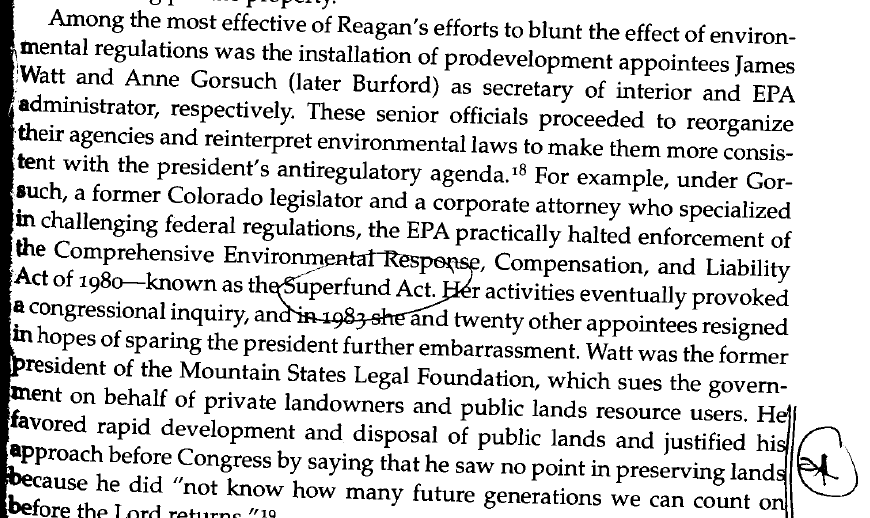- The title “entrepreneur” means someone whose job it is to make a case for salience on an issue. What is the difference between a lobbyist and an entrepreneur?
2. This quote:

Backlash against the 1970s’ environmentalists’ “honeymoon” with the institution of government regulation began in earnest in the 1980s, under mr cowboy, neoliberal extraordinaire Ronald Reagan and his anti-gov’t platform, supported industry.
The chapter details all the ways a legislator might be covert about the consequence, and use coded language in their arguments, or bury unpopular environmental rollbacks as riders in bills.
The 80s saw a rise in both anti-regulatory and pro-environmental activism.

Wise Use: a coalition of industry and individuals, formed via dozens of smaller orgs to assert liberty and freedom of individual rights to remain unlegislated with regard to federal environmental rules. The movement focused on freeing up public lands for resource usage, primarily in the West.
It’s a concept that is not “wise” (as in systemic) but rather a clever cooptation, if you think from the perspective outside of an extraction mindset.
Property Rights: focused more on the east, a fraternal twin to Wise Use, property ownership should be compensated if impeded or directed by the government to attend to environmental restrictions on their land.
– the concept of “takings” claims
– defeated the Private Property Rights Act in 1995, surprising outcry amongst voters who out-petitioned the campaign to pass this, because environmentalists made it clear that it was designed as a government-initiated deterrent to actually regulate in the public interest (it’d be too costly).
Wrap this up in the gestalt of Gingrich’s Contract with America. The notion that everything is subject first inside the Fed Gov by a cost-benefit analysis, but then what “cost” looks like is severely constrained by time lines, and a very small and tightly bounded system (of what “matters”).
Equally distressing is the perception that having an enforced land ethic is socialist. That said, while I may not love capitalism’s mechanics, the more that business ventures figure out how to make $$ by battling climate change via opportunities in renewables and material recovery for instance, a dent will be made, in the absence of governance. Also completely adjacent to the purview of government’s stewardship, what is at stake is the paradigmatic shift needed to see ourselves in a multispecies world.
Would I rather be a policy entrepreneur or an ecoterrorist?
Same tactics at work around Black Lives Matter, call the Left terrorists, amplify the extremes, whilst downplaying the extremists in the Right’s own movement.
All I can hope is that Trump’s reign is the endcap to what Reagan began… simplified, I know…

This is great to see precedents long before the current administration. Difference is, with control of all 3 arms of the federal gov’t, and zero interest or apparent urgency to compromise, Trump’s appointed officials are free to gut the systems we had in place, that looked to science instead of screeds. I feel more like an outsider and alien, a socialist, a tree hugger, and a realist. Very depressing.
The key question to discuss is Layzer’s last one at the conclusion of the chapter:

I definitely think strategies need to be reexamined, but the goals, no. I have zero answers.
Main takeaway: nothing has changed; pendulum swings, but the underlying, polarized mindset remains in tact, more reified than ever. Anti-environmentalist issues for individuals dovetails with their connection to sustaining American (mythopoetic) concepts such as individual freedoms and unalienable property rights. Industry/political commitment to certain business as usual hegemony leaves me pretty hopeless.
Questions:
Why doesn’t cost benefit analysis include true cost or ecosystem services?
A cost-benefit analysis is a process businesses use to analyze decisions. The business or analyst sums the benefits of a situation or action and then subtracts the costs associated with taking that action. Some consultants or analysts also build models to assign a dollar value on intangible items, such as the benefits and costs associated with living in a certain town.
Fun game! Mad Libs on CBA
prudent citizens conduct a cost-benefit analysis to evaluate all the potential costs and revenues that earth might generate from its conditions. The outcome of the analysis will determine whether the earth is financially feasible or if the earth should pursue another dominant species.